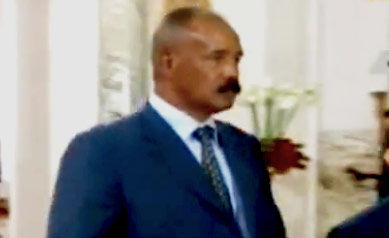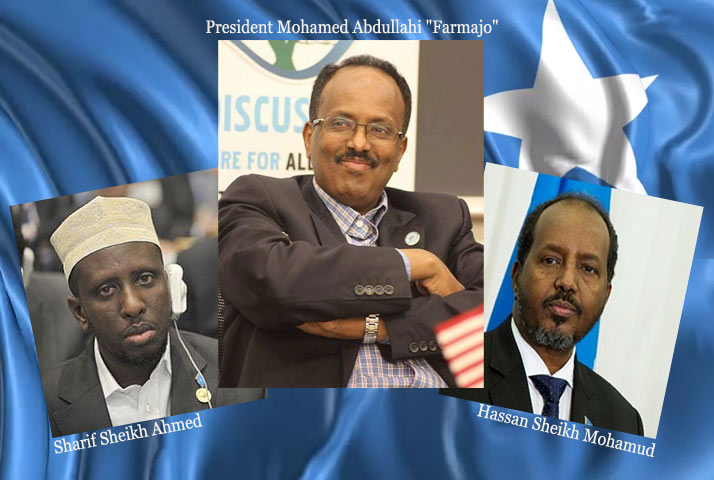Engagement and Exclusion: US, EU & Eritrea
For several years now, the United States and the European Union have been using divergent approaches to coax the regime of their once-staunch ally, Eritrea’s Isaias Afwerki, to come to the fold. For the most part, Europe was offering the carrot of unconditional development aid and the United States was waving the stick of sanctions. Neither approach has changed the behavior of the Isaias Afwerki regime; and the EU and the US are now scrambling to align their policies, with EU Commissioner Louis Michel having nothing to show for his gamble of summer 2008.
The European Union
EU is a relatively new political entity and its member states had, over the years varying degrees of relationship with the Eritrean government, going back to the days when it was a guerrilla movement.
In October 2001, the Eritrean government dismissed EU representative to Eritrea, Italy’s Antonio Bandini, shortly after he delivered an EU demarche chastising the Isaias Administration for its treatment of the G-15. The Eritrean administration claimed that Dr. Bandini was guilty of colluding with the G-15 and interfering in its “internal affairs.” Italy retaliated by expelling Eritrea’s ambassador to Italy, Tseggai Mogos.
Since then, the member states of EU have reverted to their independent positions with Italy’s Silvio Berlusconi leading the rapproachment. On April 1 2008, the EU, under the leadership of its Commissioner, Louis Michel, proposed a policy of greater engagement, proposing to grant Eritrea € 122 million in development aid from the European Development Fund.
The Eritrean community was split on this issue with supporters and opponents of the Eritrean government organizing dueling petitions. The opponents argued that the EU Commissioner was misguided, that his policy of engagement without conditions would backfire. Still, the EU Commissioner decided to proceed with the aid package and to visit Eritrea to deliver the news. Supporters of the Eritrean government were ecstatic; opponents were dejected.
EU Engagement: 12 Months Later
Gedab News has seen a letter that the European Union Commissioner sent to Isaias Afwerki on June 29, 2009. The EU Commissioner reminds the Eritrean strongman that,
“there is a growing sense of discontent that the policy of engagement and dialogue that the European Commission and the EU has followed up to now is not yielding results.”
The Commissioner advises Isaias Afwerki regarding the importance of his “sending out signals” to the EU to demonstrate his willingness to co-operate. Specifically:
“…the release from prison of journalists, and people who are in prison for political reasons and, as a first step, granting lawyers and families’ [sic] access to them….In this context, consideration should be given to the case of Dawit Isaak. His case wields considerable influence on European public opinion…”
.
A month before receiving the EU letter, Isaias Afwerki had sent his “signal” in an interview with Swedish TV: Dawit Isaak was an Eritrean citizen, and not a Swedish citizen who had “got involved in messy thing” with various intelligence agencies and “was hold accountable and that is the end of the story….we don’t release him and we don’t bring him to trial…never.”
After inviting Isaias Afwerki to send “signals,” the Commissioner tells him that Europe appreciates it “very much” when Eritrea is engaged positively in the region and could it please use its influence in Somalia to do so again. The Commisioner closes his letter by expressing his “sincere hope” that “we will not be deceived and that Eritrea will answer our call.”
The United States
The Isaias Afwerki government used to enjoy warm relations with the United States for most of the 1990s, when it (along with the governments of Ethiopia, Uganda and Rwanda) was praised as part of the African Renaissance movement and a “frontline state” in the then-undeclared war against terror. The relationship took a turn for the worse in 2000 when the Eritrean regime accused Anthony Lake, the US envoy to Eritrea, of plotting to overthrow the Eritrean president and of colluding with the G-15 (Eritrean dissidents) to telegraph signals to the Ethiopian government to attack Eritrea.
In subsequent statements, the Eritrean regime accused the CIA of being part of the conspiracy. Shortly after September 11, 2001 and well into the first year of American invasion of Iraq, the Isaias Afwerki and the George Bush administrations were in good terms. (Eritrea was one of the members of the “Coation of the Willing.”) But the Eritrean regime’s frustration continued to grow when, following the 2004 Boundary Commission ruling that the disputed territory of Badme be awarded to Eritrea, nothing changed on the ground, a fact it attributed to American refusal to pressure Ethiopia to do so. In 2005, the Eritrean regime accused the US State Department of conspiring with Ethiopia’s Meles Zenawi to steal the Ethiopian election. For good measure, it began to criticize US involvement in Iraq retrospectively when, in fact, it was one of only half a dozen African states that had supported it in 2002.
In 2006, Eritrea and the United States supported different actors in the Somali civil war. One of the actors the Eritrean regime supported, Aweys, was on the United States, Canadian and United Nations list of suspected terrorists.
It is Eritrea’s role in Somalia and, more recently Djibouti, that has raised the ire of the Bush and now Obama administration. Secretary Clinton has signaled that the US would be willing to engage Eritrea provided that the latter took steps reversing its “spoiler” role in Somalia.
A Conference To Align EU-USA Policy Towards Eritrea
The European Union will host a two-day conference on Eritrea beginning on November 9. Mr. Luisa Morgantini, the former Vice-President of the European Parliament, is scheduled to open the conference.
The conference is organized by European External Policy Advisory (EEPA), a Belgian NGO entity represented by Dr. Mirjam Van Reisen.
The conference aims to align the policies of the EU and the USA toward Eritrea and the Horn of Africa region and to promote democracy and human rights in the region.
Those expected to attend the EU conference of November 9 and 10 include: Kathleen Ferrier, MP; Roger Moore, Director Horn of Africa, Directorate-General Development, European Commission; Karl E Wycoff, Deputy Assistant Secretary for the Horn, State Department; Ambassador Ana Gomes, Member of the European Parliament; Jonathan Elliott, Human Rights Watch, Africa Advocacy Director; Giampaolo Calchi Novati, Head of the Africa Programme at ISPI, professor, University of Pavia, History of Africa; Emma Achilli, EU Human Rights and Democracy Initiative, European Commission; Eva-Britt Svensson, MEP, Sweden, European Parliament; Judith Sargentini, MEP, Netherlands and former democracy activist Southern Africa; Anthony Carroll, Vice President, Manchester Trade Ltd, policy specialist on the Horn, Washington, USA; Tom Vens, Eritrea desk, European Commission; Guillaume Lacroix; European Council, Africa; Thijs Berman, MEP; Mohamed Ahmed Jama, Director of the Somali Organization for Community Development Activities (SOCDA) in Mogadishu; Karl E Wycoff, Deputy Assistant Secretary for the Horn, State Department; Jeremy Lester, Head of Unit Horn of Africa Region, Directorate-General Development, European Commission Page; Eshetu Bekele, Executive Director, Poverty Action Network of Civil Society Organizations (PANE) in Ethiopia; and Elsa Chyrum, an Eritrean Human Rights Activist.
The ambassadors of Ethiopia, Sudan, Djibouti and Eritrea have also been invited but the Eritrean ambassador, Mr. Girma Asmerom, is unlikely to attend.
Scheduled speakers include Mr. Koos Richelle, the Director of EuropeAid at the EU; Mr. Robert Houdek , the former ambassador to Eritrea and Ethiopia; Mr. Kjell Bondevik, formerly the prime minister of Norway and now president of the Oslo Center for Peace and Human Rights; and Dr. Bereket Habteselassie, Distinguished Professor of African Studies and Professor of Law at the University of North Carolina and the former Chair of the Constitutional Commission of Eritrea and Mr. Dan Connel, author, journalist, Distinguished Lecturer in journalism and African politics at Simmons College, Boston will give a speech in the session.
The Eritrean “Task Force” At The Conference
A group of Eritreans with close links to Kassahun Chekole and Ana Gomes, has also been formed to attend the conference. The individuals attending and the organizations they are affiliated with are as follows:
Ms. Selam Kidane, (Release Eritrea)
Mr. Noel Joseph, (EHDR-UK)
Mr. Daniel Rezene Mekonnen, CDRiE
Mr. Abdulrahman Sayed, CDRiE
Professor Gaim Kibreab, CDRiE
Mr. Suleiman A. Hussein, CDRiE
Ms. Mehret Gebreyesus, EDP
Mr. Dawit Mesfin, EDP
Mr. Woldeyesus Ammar, joint leadership committee of EPP, EDP and EPM
Abdulrahman has been appointed the spokesperson for the conference.




Awate Forum